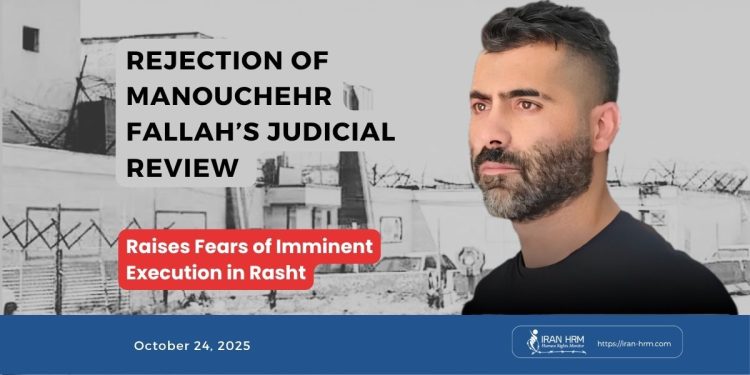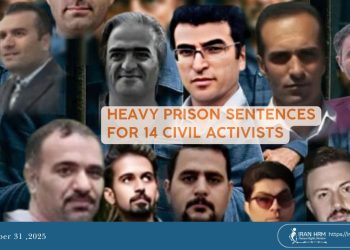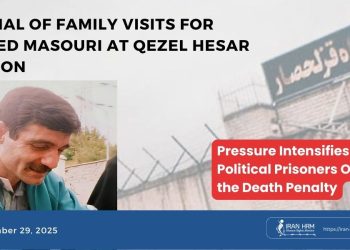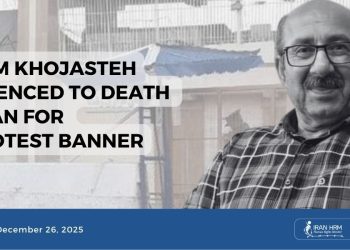The Supreme Court’s rejection of a judicial review for Manouchehr Fallah, a political prisoner from Rasht and one of those detained during the 2022–2023 nationwide protests, has sharply escalated concerns among human rights defenders. Fallah now faces an imminent risk of execution, and his case is emerging as one of the most urgent death penalty cases under the ruling regime in Iran.
Death Sentence over an Alleged Minor Blast Causing Only Property Damage
Manouchehr Fallah, 42, is married and the father of a teenage daughter. He has been held in Lakan Prison in Rasht since 18 June 2023 (28 Khordad 1402). He was first prosecuted on the charge of “propaganda against the regime” and sentenced to 11 months in prison. After serving that sentence, bail of 400 million tomans was reportedly approved and his release should have followed. Instead, security and judicial authorities blocked his release and opened a new file against him.
In the second case, Fallah was charged with “enmity against God (moharebeh) through action against national security.” The allegation concerns a small homemade sound device that reportedly exploded at the entrance of the Gilan provincial judiciary building in the early hours of 1 June 2023 (11 Khordad 1402). According to official expert assessments cited in his case file, the explosion caused only superficial damage — roughly 15 million tomans’ worth — to the metal gate and stone façade. No one was injured and there were no casualties.
Despite that, Branch 2 of the Revolutionary Court in Rasht, presided over by Judge Darvish Goftar (son), ruled that the act amounted to “destruction with intent to disrupt public order and confront the state,” and sentenced him to death. The death sentence was formally notified to his lawyers on 2 February 2025 (14 Bahman 1403) and, most recently, the Supreme Court rejected his request for retrial, clearing the path for the sentence to be carried out.
Lawyer: “Gross Disproportion Between Allegation and Punishment”
Fallah’s lawyer, Milad Panahipour, denounced the ruling as a violation of basic due process and proportionality. He stated that Fallah’s case has “no private complainant, no bodily harm, and only minor property damage,” and that imposing the death penalty in such a case is “unprecedented and profoundly unjust.”
Panahipour further stated that Fallah’s statements were extracted under coercion and psychological pressure, and are therefore invalid as evidence. He added that the proceedings were conducted without allowing Fallah access to legal counsel of his own choosing, effectively stripping him of his right to an adequate defense and to a fair trial.
These concerns mirror a broader pattern identified by human rights lawyers, who warn that Revolutionary Court trials in politically sensitive cases are often rushed, closed, and reliant on forced “confessions.”
Worsening Health in Lakan Prison and Denial of Medical Care
Reports from inside Lakan Prison indicate a serious deterioration in Fallah’s physical condition. Fellow inmates have described prolonged and severe stomach pain, weakness, and persistent insomnia. Despite repeated requests for transfer to an outside medical facility, prison authorities have refused to send him for proper treatment.
Prison officials reportedly claimed that Razi Hospital in Rasht “lacks the necessary facilities,” a claim that other detainees and families have described as a deliberate falsehood. Human rights observers note that denial of medical care to political prisoners is routinely used by the regime as a form of coercion, known informally as “white torture.” Such treatment violates Articles 6, 7, and 10 of the ICCPR, which protects the right to life, prohibits torture, and obliges states to treat detainees humanely.
Letter from Prison: “Hope Remains Alive”
In February 2025 (Bahman 1403), on the 16th birthday of his daughter Asal, Manouchehr Fallah wrote an open letter from prison. In the letter, he tells his daughter:
“One day the sun of freedom will rise in this land, and a heavy price will be paid for it; this time the lot has fallen to me. Know that hope remains alive, and one day our homeland will be freed from oppression and injustice.”
He adds that he has “committed no crime,” that he “has not stolen from the people,” and that his only ‘offense’ was to speak out against poverty, inequality, and injustice. The letter underscores the personal cost of repression and the intergenerational trauma inflicted on families of political detainees under the ruling regime in Iran.
Amnesty International Names Manouchehr Fallah among Prisoners at Risk of Execution
On 27 July 2025, Amnesty International issued a public statement titled “Iran: Horrifying secret executions amid mounting political repression.” The statement condemned the secret and arbitrary executions of two political dissidents, Behrouz Ehsani and Mehdi Hassani, in Qezel Hesar Prison. Amnesty further listed a group of prisoners at risk of execution for politically motivated charges — explicitly naming Manouchehr Fallah among them. It warned that authorities may execute other political prisoners on death row in secret, without due process. The organization called for an immediate moratorium on executions and urged other states to hold Iranian officials accountable under universal jurisdiction.
Read Amnesty International’s statement: https://www.amnesty.org/en/latest/news/2025/07/iran-horrifying-secret-executions-amid-mounting-political-repression/
Immediate Call for International Intervention
Following the Supreme Court’s refusal to reopen his case, human rights organizations, legal advocates, and Fallah’s family are urging urgent intervention by the UN Human Rights Council, the EU, and the UN Special Rapporteur on Iran. They warn that Fallah could be executed at any moment.
Fallah’s family has appealed publicly: “Manouchehr’s life is in danger. Silence in this moment is complicity.”







